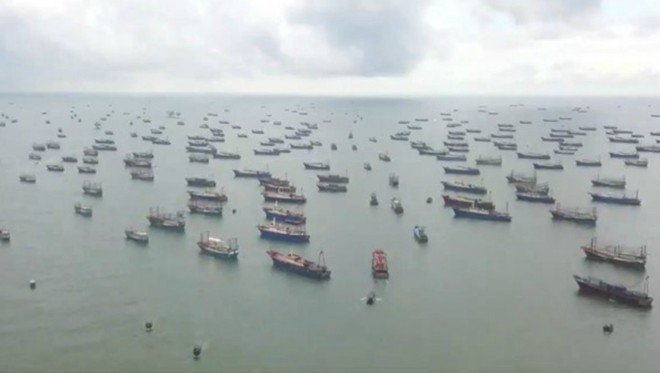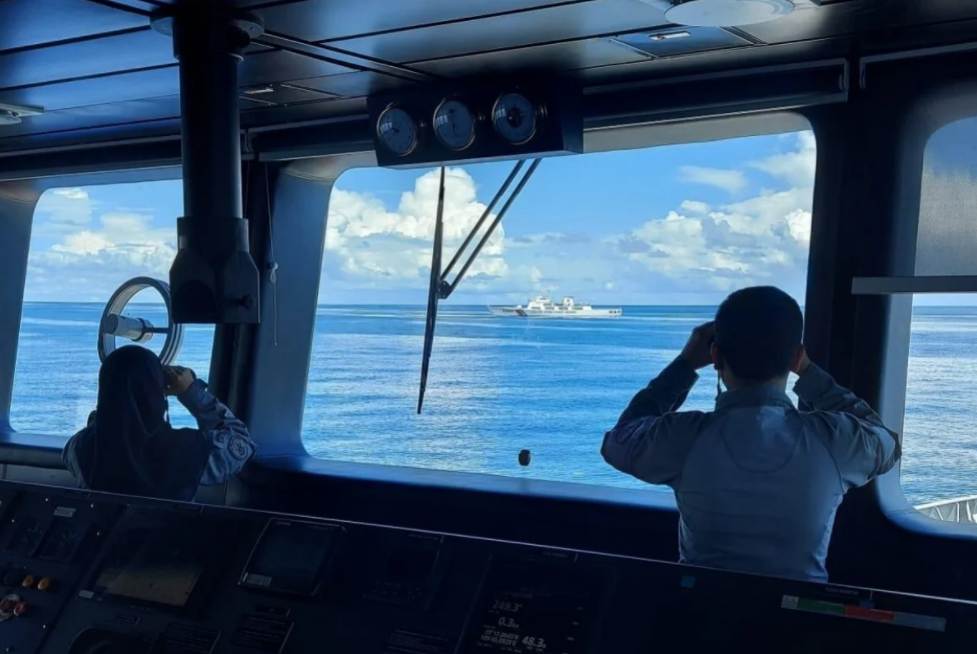France, Germany, UK reject China's claims in South China Sea (Bien Dong Sea) in note verbale
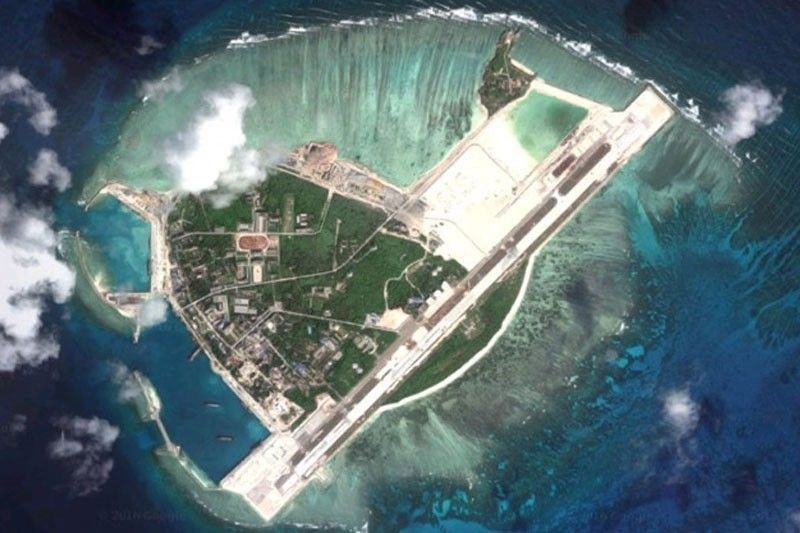 |
| In a note verbale submitted on Sept. 16 to the UN, France, Germany and the UK underlined the importance of unhampered exercise of the freedom of the high seas, in particular the freedom of navigation and overflight, and of the right of innocent passage enshrined in UNCLOS, including in the South China Sea. Google Earth, File |
France, Germany, and the UK have expressed their opposition to China’s expansive claims in the South China Sea (called Bien Dong Sea in Vietnam) in a note verbale addressed to the United Nations (UN) on September 16.
Integrity of 1982 UNCLOS
In their submission, the three European powers recalled the universal and unified character of the 1982 United Nations Convention on the Law of the Sea (UNCLOS) that sets out the legal framework within which all activities in the oceans and seas must be carried out.
They underscored that the integrity of the Convention needs to be maintained, as reaffirmed by the United Nations General Assembly in its annual resolution on oceans and the law of the sea.
The countries also underlined the importance of unhampered exercise of the freedom of the high seas, in particular the freedom of navigation and overflight, and of the right of innocent passage enshrined in UNCLOS, including in the South China Sea.
They emphasised the specific and exhaustive conditions set forth in the Convention for the application of straight and archipelagic baselines which are defined in Part II and Part IV of UNCLOS.
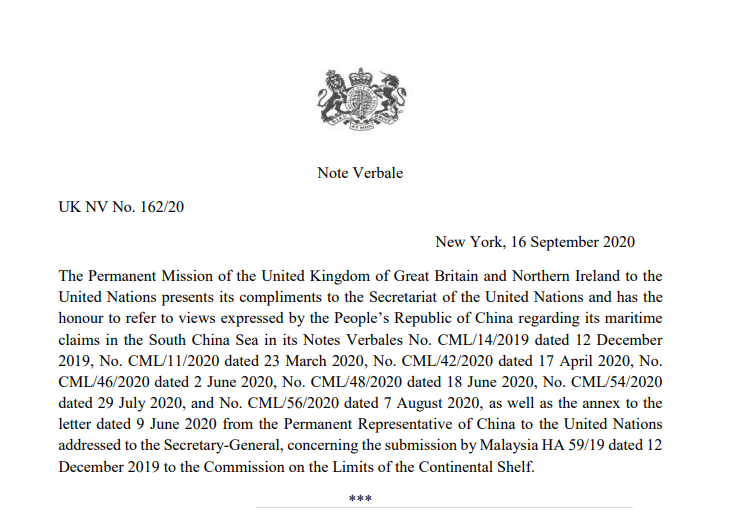 |
| The note verbale addressed to the United Nations on September 16 |
Therefore, they said, there is no legal ground for continental States to treat archipelagos or marine features as a whole entity without respecting the relevant provisions in Part II of UNCLOS or by using those in Part IV applicable only to archipelagic States.
Land building activities or other forms of artificial transformation cannot change the classification of a feature under UNCLOS.
Claims with regard to the exercise of “historic rights” over the South China Sea waters do not comply with international law and UNCLOS provisions, they stressed, adding that the arbitral award in the Philippines v. China case dating to July 12, 2016 clearly confirms this point.
They held that all maritime claims in the South China Sea should be made and peacefully resolved in accordance with the principles and rules of UNCLOS and the means and procedures for the settlement of disputes provided for in the Convention.
Long-standing legal positions
This position is reaffirmed without prejudice to competing claims of coastal states over disputed territorial sovereignty to naturally formed land features and to areas of the continental shelf in the South China Sea on which France, Germany and the UK take no position, the countries said.
“This joint Note Verbale reflects our long-standing legal positions and is complementary and without prejudice to any further positions that France, Germany and the United Kingdom have stated in the past, both bilaterally and together with other States Parties to UNCLOS.”
As states parties to UNCLOS, they vowed to continue to uphold and assert their rights and freedoms as enshrined in UNCLOS and to contribute to promoting co-operation in the region as set out under the Convention.
Why this matters
 |
| Royal Navy warship HMS Argyll joined the US Navy for combined workout in the South China Sea in January 2019. Photo: US Navy |
The European countries’ latest statement comes after the US stepped up its pressure against China, signaling what many analysts view as a looming Cold War between Washington and Beijing.
France, the UK, and Germany’s position also followed recent high-profile virtual meetings between Europe and China, where European countries took increasingly tougher stance in their China policy.
Retired Philippine Supreme Court justice Antonio Carpio and internationally-renowned lawyer Paul Reichler had pointed out that the effort of countries to invoke the ruling and call out China’s expansive claims was one of the best ways to enforce the landmark 2016 Hague ruling, Rappler said./.
| China claims almost all of the South China Sea based on a so-called nine-dash line. In a landmark ruling on July 12, 2016, The Hague-based Permanent Court of Arbitration found no legal basis for China to claim historic rights to a “nine-dash line” in the South China Sea and that Beijing had breached the sovereign rights of the Philippines, which brought the case. China, however, has opposed and refused to honor the tribunal ruling, according to Philstar. Beijing has likewise refused to accept any proposal or action based on the arbitral tribunal decision, calling the ruling junking its claims to historic sea rights as illegal and invalid. |
 | China's unlawful claims on Bien Dong Sea faces strong international opposition China’s South China Sea sovereignty claims have endured strong criticism from various countries globally, including the United States and Australia, which state that these claims ... |
| Forces of "ferocity" in the Bien Dong Sea (South China Sea) A recent report by the US Department of Defense reaffirms that China is using maritime militias with large ships to harass the Bien Dong Sea ... |
 | South China Sea (Bien Dong Sea) and tensions between powers With flybys, missile launches, sanctions and military drills, both China and US are heating up tensions in the South China Sea (called Bien Dong Sea ... |
 Seas and islands
Seas and islands
Vietnam Demands China Respect The Country's Sovereignty in East Sea
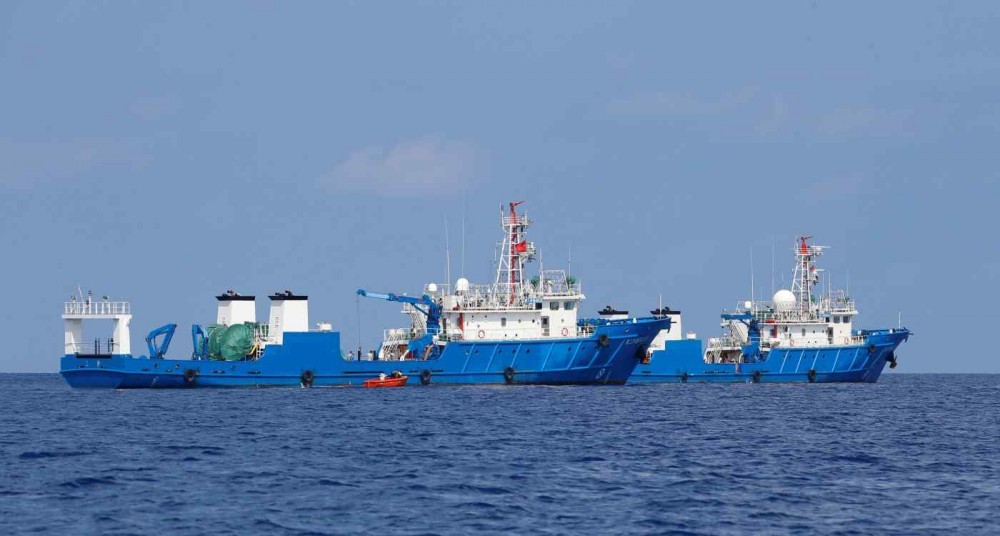 Focus
Focus
Promoting Substantive And Effective Code of Conduct in The South China Sea
Recommended
 Seas and islands
Seas and islands
Vietnam Endorses Common Voice on Ocean Jurisdiction
 Seas and islands
Seas and islands
Dialogue as Key to Settling Disputes and Advancing Law of the Sea
 Seas and islands
Seas and islands
RoK Navy Ship Pays Friendly Visit to Da Nang City
 Seas and islands
Seas and islands
Naval Region 5 Promotes Reading Culture, Fosters Patriotism
 Seas and islands
Seas and islands
Coast Guard Region 2 Command Hosts Philippine Coast Counterpart
 Seas and islands
Seas and islands
Vietnam - Thailand Navy: Coordination to Well Address Problems at Sea
 Seas and islands
Seas and islands
Honoring the Fallen: Incense Offering for the 37th Anniversary of Gac Ma
 Seas and islands
Seas and islands

